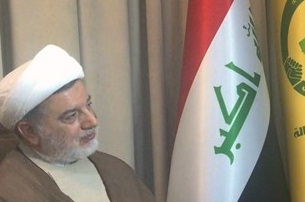
RNA - In an interview in Baghdad, Humam Hamoudi, who is also leader of the Supreme Islamic Council of Iraq, explicated his political party’s positions and future plans as Iraqis are gearing up for the parliamentary elections slated for Saturday.
Hamoudi is the second top figure in the list of Fatah Alliance candidates running for the parliament.
Asked about his party’s standing in the polls, the senior cleric said the Supreme Islamic Council of Iraq has conducted a number of polls across the country, except for the Kurdistan Region, over the past three months, whose outcomes demonstrate that the Fatah Alliance has the lead by a wide margin.
Except in some western provinces, the Fatah Alliance seems to be taking the first place, Hamoudi said.
On political developments after the elections, the cleric said his party has already begun coalition talks, saying the views of the parties to be merged should be heard.
He then highlighted his alliance’s determination to change the situation and rise to the challenges with strong motive and new approaches.
Hamoudi further ruled out any connection between the Fatah Alliance and Hashd al-Shaabi (the Popular Mobilization Units), saying none of the Fatah candidates are currently a member of the Hashd al-Shaabi forces.
Those Fatah Alliance candidates that used to serve in Hashd al-Shaabi, such as top figure Hadi al-Ameri, have resigned from their posts before entering the alliance.
The former Hashd al-Shaabi members in the current list of Fatal Allaince are not permitted to even have a Hashd al-Shaabi ID card, he said.
Hamoudi also explained that the Fatah party is only inspired by the great motivation of Hashd al-Shaabi forces and their genuine assistance in the war on terrorism, saying top Shiite cleric Grand Ayatollah Seyed Ali al-Sistani also insists that Hashd al-Shaabi forces should stay away from politics and remain popular and state-backed fighters.
Iraqis will head to the polls on May 12 to elect a new national parliament, which will serve as the basis for the formation of a new government.
The polls will mark Iraq's fourth parliamentary elections since the 2003 US-led invasion, and the first national referendum since the defeat of Daesh (ISIL or ISIS) terrorist group in 2017.
Source: Tasnim
847/940